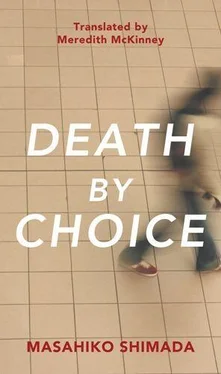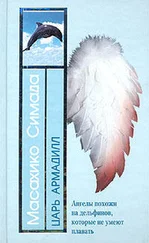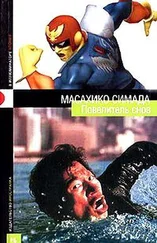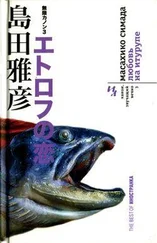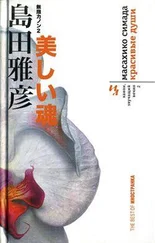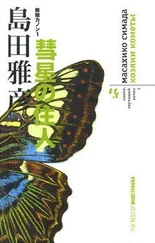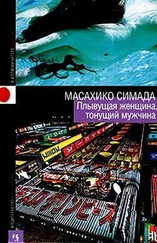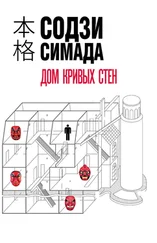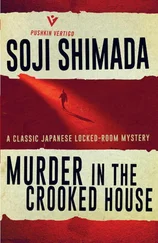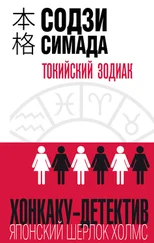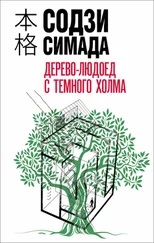Kita was headed for Sapporo station. As he walked, he eyed the cars parked along the road. Having scrutinized the makes, number plates, and interiors of each car he passed, he came to a halt in front of a BMW with a Tokyo license plate, and put his hand on the door. Needless to say, it wouldn’t open. He walked another ten yards, and tried a Nissan Skyline with a local Sapporo plate. No luck.
“You’re trying to steal a car?” the doctor asked irritably.
“They’re all locked,” muttered Kita. Well of course. Yet he doggedly went on trying one after another. He was sick of walking.
The doctor got ahead of him and paused at a Chevy Camaro with an Osaka plate. He beckoned Kita. “This one has ‘Please make free use of this vehicle’ written all over it. Let’s take it.” He took from his bag what looked like a metal ruler, inserted it between the doorframe and the window, and began to pump it gently up and down. Immediately there was the shriek of an alarm piercing enough to tear the flesh from one’s temples. The doctor frowned, but didn’t pause in his work. The lock broken, he slid into the car, opened the hood, briefly fiddled with the electronics, and the alarm stopped. He started the engine.
Kita had been standing there with his hands to his ears. The doctor motioned him into the driver’s seat, settled down beside him, put on his seat belt, and tutted in vexation.
“Come on, what’re you hanging around for? Get this car moving.”
Kita took a short breath. Then he wheeled the white Camaro around and set off in search of his execution ground.
The doctor didn’t ask where they were going. He settled back and closed his eyes, letting things take their course. He woke from his nap with the nasty feeling that Kita was clumsily up to something again.
The roads decided where the white Camaro went. It raced straight along whatever road it happened to be on until it had to turn, and then alternated right and left at each new junction. There’d be no going back from this journey.
Kita was pretty impressed with the doctor’s car thieving skills. It wasn’t just organs that the guy could steal, it seemed. In this man’s hands, his corpse would be quickly dispatched. Kita looked at the sleeping doctor with renewed awe and fear.
It was a fabulous car for speeding. It seemed almost made to be crashed. “Thanks for such a great gift,” whispered Kita, but the doctor pretended he hadn’t heard.
Now and then the road was momentarily illuminated by the stark light of a gas station or convenience store or drinks machine. It seemed so insubstantial it might disappear at the merest puff of breath. And sliding along it the white Camaro seemed it might melt into thin air if he closed his eyes for a moment, Kita thought. The steering wheel and accelerator were amazingly light to the touch, and his own body too could have been made of styrene foam it felt so weightless. Bearing down on this feather-light accelerator, he felt a thrill run right from his temples down his back. He pushed the speed up a bit further, past seventy-five miles per hour, and the thrill ran down over his knees. If he really put his foot down, the thrill would reach his heart and penetrate his pores and blood vessels, and he’d crash to instant death, laughing till he drooled. The white Camaro would be his coffin. And if a spark ignited the gas in the tank, that would deal with the cremation at the same time.
The speedometer now registered over ninety, and the street lights sped by like fighter planes. There were only a few inches separating him from death. Within his narrow field of vision, a stark white high-rise sprang up like a gravestone. Narrowing his eyes, he made out the word “Hospital.” He slammed on the brakes, and in the same instant his pulse started throbbing violently and the weight returned to his body.
Held firmly by his seat belt, the doctor gave a low groan. The tires squealed around a gentle curve in the road. The thrill that had been rushing through Kita’s body now subsided, replaced now by a stirring and hardening between his legs.
“You were going to take me with you there, weren’t you?” the doctor muttered hoarsely.
“I wouldn’t have minded just crashing the car back there, but then I saw that hospital.” Kita glanced sideways at the doctor, who was wiping the sweat from his hands, hollow-eyed.
“Goddamn hospitals everywhere you go,” the doctor spat.
“You don’t like hospitals?”
“They make my heart ache.”
Kita gave a laugh like a cough. Fancy that, this man who could dispose of people and bring them back to life as casually as he’d move chess pieces around a board actually had a heart. “You look done in,” he said sympathetically. “Don’t worry, you can rest easy. I don’t plan on killing you too.”
The doctor raised his hands, spread his fingers and yawned, trying to get his circulation going again. It was all very well to be told he could rest, but how could he possibly doze in this hearse with someone bent on dying at the wheel? Besides, the law stipulated there should be only one corpse per hearse.
Perhaps it was having just passed a hospital that had given the doctor his nightmare. He had been in a high-ceilinged hall, full of dazzling light. Around fifty people sat in the audience holding their breath, their eyes fixed on him. He was in the midst of a performance of heart massage. He climbed on top of the patient on the operating table and sat there, both hands to the inert heart, leaning his weight into the task of pumping it at varied rhythms and tempos. He was a percussionist, and the audience was appreciating his concert.
He went on massaging, working up a great sweat as he pumped. The muscles in his arms were jelly, and pain and exhaustion gripped his back. He wiped the drops of sweat from his brow with his white sleeve, and glanced at the audience. Some were dozing. Others were rising to leave. Still the doctor couldn’t end his performance. There would be no rest for him until the heart began to beat of its own accord again. But even that rest would be only brief, before he had to begin work on the next patient. More and more patients in cardiac arrest were being brought into the hall.
Even if he failed to resuscitate someone, the doctor thought, he wasn’t directly responsible for his death. It was now around two hours since the heart had stopped. The situation was hopeless. Continuing the heart massage was a mere formality.
He was tired. He longed to stop. There was no way the patient would revive. Yet the audience was poised to applaud the very moment the patient was resuscitated. If he got down from the table now, they’d not only boo him, they’d lynch him. A thought came to him: what if he fainted right now?
The next instant, the prone patient opened his eyes, and gave him a leer that seemed to see through to his very soul. The doctor felt his own heart squeeze tight, and at that moment the dream bumped him back into reality.
“Could you please go someplace where there isn’t a hospital?” he asked Kita confidingly.
“I don’t suppose you’ve been dreaming of all the patients you killed getting their own back on you, have you?”
The doctor sighed in response, and said, “Heart massage is a nightmare. I’ve had it up to here.”
“It really does make your heart ache, eh?”
The doctor could remember heart massages that had gone on for four hours straight. If there’s no response within thirty minutes, you can generally assume brain death, but the patient’s family still hadn’t shown up so he had to keep going. You have to show the relatives that you’re massaging the heart. The doctor will go on trying until he’s too exhausted to pump any more, so that the relatives will acknowledge that he’s done all he could. The family will use the doctor’s sweat as surety for the fact of their relative’s death. That’s the custom in hospitals.
Читать дальше
